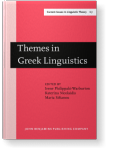Table of contents
List of contributors
I. Plenary papers
Contemporary linguistics and the teaching of modern Greek1
Transformational grammar and modern Greek syntax: an overview and some ‘problematic’ cases11
On weak subjects and pro-drop in Greek21
New approaches to some problems of Greek phonology33
II. Syntax-semantics-pragmatics
Verb movement and minimal clauses45
Verb movement and clitics in modern Greek53
The properties of Pu-complements in modern Greek61
On the interaction of case and definiteness in modern Greek69
Visibility versus suppression77
Post verbal subjects, reduplicated objects or retopicalisation?85
Checking theory, subject extraction, and the theory of movement93
Non-pronominal anaphora interpretation in modern Greek101
Spare determineers in modern Greek noun phrases: An HPSG account107
Some remarks on DPs in modern Greek115
Syntactic indeterminacy in the light of prepositional constructions123
The pragmatic category ‘perfect’129
The interaction of lexical and grammatical aspect in modern Greek137
On aspectual and temporal adverbs145
Specification of temporal intervals and situations in the perfect153
Problems of Greek aspect morphology and the identification of projection for tense and aspect161
Structural and cross-linguistic regularities in the history of three particles169
Na-interrogatives in modern Greek: Their interpretation and relevance177
Mood and modality in modern Greek: The particle Na185
The verbs @@ and cilt 117 in modern Greek193
III. Phonology-phonetics
Stress domains in Greek compounds: A case of morphology-phonology interaction201
Government and element-licensing: the modern Greek evidence209
Naturally occuring hiatus in modern Greek217
Aspects of lingual articulation in Greek: an electropalatographic study225
On the intonation of several modern Greek sentences233
The intonation of modern Greek as produced by 9–18 year old British born speakers of Greek origin241
IV. Discourse and style
Conceptual metaphor in Greek financial discourse247
Linguistic attitudes and metalinguistic discourse: An investigation in the Cypriot press253
‘If it was your sister…?’: Personalisation in arguments261
Miscommunication in the discourse of Greek In-groups269
The historical present in Modern Greek narratives277
The use of diminutives and augmentatives in Modern Greek283
Lexical density as a characteristic of the discourse of history of Greek textbooks289
The power of politeness in the Greek EFL classroom297
A stylistic study of the ‘Odes’ of Andrea Kalvos: Original metaphors and syntagmatic relations305
Mood in the chronicle of Leontios Machairas313
V. Variations and extensions
The Acquisition of conditionals in Greek319
Morphology and word order in the processing of Greek sentences: A crosslinguistic and developmental study325
The development of subordinate clauses in the language of Greek Children333
The concept of Diglossia from Ferguson to Fishman to Fasold341
Discourse marking in Australian Greek: Code interaction and communicative resourcing349
Towards a formal analysis of the Greek-French Code-switching in Paris357
Lexical Borrowing in immigrant varieties of Greek365
Morphological variation of the passive imperfect in modern Greek373
Semantic-intonation units on One word Yes/no questions381
A case of whistled speech from Greece389
Language change under way? The case of the definite article in modern Greek397
Infinitival constructions and case assignment: a case of a consecutive fromula in the delphic Corpus405
Problems in diachronic syntax: Free relatives in medieval and modern Greek413
Ancient greek dialects in northern Greece421
Spatial expressions in Byzantine vernecular Greek427
Son of Wackernagel: The distribution of object clitic pronouns in Cappadocian435
The semantic adaptation of Turkish Loan-words in the greek Cypriotic dialect443
The history of Cypriot Greek mirrors the history of the island: example the medieval period449
Ethnic Greek group of Tsalka and tetritskaro(Georgia)457
Modern Greek in the Romanian principalities: The 18th century463
VI. Language and computers
The commission’s SYSTRAN English-Greek Machine translational systems471
A computational model for the morphological analysis of the modern greek noun category483
Greek terminology within the multilingual environment of EURODICAUTOM491
Modern Greek on the microcomputer: The ‘Grevoc’ project499
A corpus-based approach to modern Greek language research and teaching507
Support-nouns: application to the special lexicon of tennis515
Index of authors521
Index of topics and languages529
This article is available free of charge.
